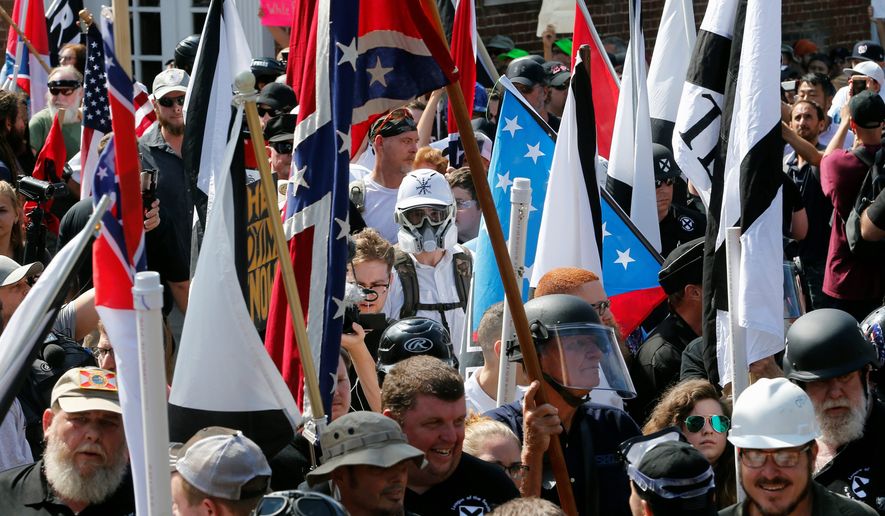OPINION:
It’s an ill wind that blows nobody good, and the wind blowing past the graveyard of dead generals is making some clever, cynical people very rich.
No organization exploits misery and suffering like the Southern Poverty Law Center, which makes millions off the hate it promotes in the name of tolerance. The poverty players have raised so much money from credulous big-hearted donors that is has to float millions of dollars to banks in the Caribbean to avoid scrutiny — and U.S. taxes.
The Ku Klux Klan once boasted 4 million stuffed sheets but it can’t attract a crowd large enough now to fill a television screen without the FBI’s paid informants. But the Center, or SPLC, has breathed new life into the corpse.
The SPLC has lately been on the scout for new outrages, real or invented, to exploit. In the wake of Charlottesville it devised a “hate map” of 917 organizations from across the country that CNN News, the Center’s sometime partner in crime, calls “all the active hate groups where you live.” This is fund-raising built on invention and deception writ large.
“Why is the Southern Poverty Law Center doing this?” asks Brad Dacus of the Pacific Justice Institute, a Sacramento-based group that defines its mission as defending “religious freedom, parental rights and other civil liberties without charge.” The answer is simple. “They want to vilify and isolate anyone who doesn’t agree with their very extremist leftist policy and ideology. This isn’t about defending civil rights; this is about attacking civil rights.”
Many mainstream media outlets once used the SPLC’s statistics on hate crimes, but their statistics are no longer widely regarded as reliable. Apple gave the Center a million dollars in the hysteria amidst the Charlottesville hysteria, and J.P. Morgan Chase gave $500,000. Proper due diligence was obviously waived.
This week the hate list grew by three of the largest U.S. Army bases — Fort Hood in Texas, Fort Bragg in North Carolina, and Fort Benning in Georgia — because they were named decades ago for obscure long-dead Confederate generals, which the SPLC says have “the potential to unleash more turmoil and bloodshed.”
The Army has indeed trained men at those bases to unleash “turmoil and bloodshed” on the nation’s enemies in several wars, and it’s a good thing the Army did, but the SPLC isn’t after merely giving the bases new names. They demand “taking them down.”
The Southern Poverty Law Center is the child of an Alabama entrepreneur, Morris Dees, a mail-order fundraising wizard who raised money for George Wallace, the governor who stood in the schoolhouse door to prevent public-school desegregation in Alabama, and George McGovern, the 1968 presidential nominee of the Democrats.
Mr. Dees did not seem to be moved by the civil-rights revolution that ranged across the South in the 1960s, content with his profitable direct-marketing business and a neglected law practice. He had made millions selling cookbooks, birthday cakes, tractor cushions and rat poison. Then he heard opportunity knocking louder.
“Morris and I shared the overriding purpose of making a pile of money,” his partner, a lawyer named Millard Fuller, told Harper’s magazine. “We were not particular about how we did it. We just wanted to be independently rich.” The Southern Poverty Law Center was born.
Mr. Fuller had second thoughts later about how they did it, and sold his half of the partnership to Mr. Dees, donated the money to charity, and joined Habitat for Humanity.
The Center’s lawyers, liberals all, quit in protest several years later when Mr. Dees declined to address homelessness, voter registration and affirmative action, which he thought would have limited appeal to white liberals, because the Center’s programs were designed, a lawyer departing later told Harper’s magazine, to cash in on “black pain and white guilt.”
In a new look at the Center, a tax-exempt nonprofit charity, the Washington Free Beacon details how that the Center has become a fundraising powerhouse, paying six-figure salaries to its key employees. Mr. Dees, “chief trial counsel,” was paid $375,000 annually in the Center’s 2015 tax filings, and Richard Cohen, the CEO, was paid $370,000. The Center boasts 76 lawyers to pursue justice for children, immigrants and the transgendered, but of the millions it hoards abroad, it spent only $61,000 on legal services. Where does the Center find lawyers to work for fees like that?
“I’ve never known a U.S.-based nonprofit dealing in human rights or social services to have any foreign bank accounts,” Amy Sterling Casil, CEO of Pacific Human Capital, a California-based nonprofit consulting firm, tells the Free Beacon. “It’s a huge red flag and would have been completely unacceptable to any wealthy, responsible, experienced board member I ever worked with.”
But Morris Dees has the pile of money he says was the point of the scheme.
• Wesley Pruden is editor in chief emeritus of The Times.




Please read our comment policy before commenting.